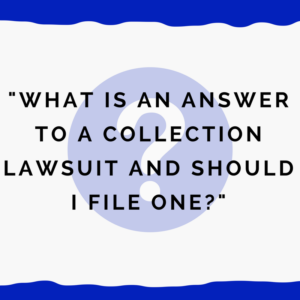“What is an Answer to a collection lawsuit and should I file one?”
“What is an Answer to a collection lawsuit and should I file one?”
 When you are sued in Alabama by a debt buyer — whether it is Cavalry, LVNV, Midland or Portfolio Recovery — you will be served with the lawsuit or the “complaint” and you need to answer the lawsuit.
When you are sued in Alabama by a debt buyer — whether it is Cavalry, LVNV, Midland or Portfolio Recovery — you will be served with the lawsuit or the “complaint” and you need to answer the lawsuit.
To answer means that you respond and either agree to what the debt buyer/debt collector says or you don’t agree with the allegations in the complaint.
If you don’t answer, you will have a default judgment against you.
In Circuit court you have 30 days to answer after you have been served.
In Small Claims and District Court, you have 14 days to answer after you have been served.
I know sometimes people think collection lawfirms can’t or won’t default you, but they will.
Understand these collection lawfirms are set up to know exactly when to default you and normally the judges will grant the motion for a default judgment.
Some folks have written on the internet that default judgments are not valid — they don’t mean anything, etc.
This is NOT true in Alabama (or anywhere else I know of).
A default judgment is a real judgment.
Well, how bad is a judgment? Let’s take a look at it….
If you have a default judgment, you can be garnished at your job and bank.
When the debt collection lawfirm has the default judgment, they can often take everything in your bank account.
They can serve a garnishment notice on your employer and take 25% of your wages.
Either one of these is devastating to most families.
It is no excuse or defense to say “I can’t live without this money” or “I think it is unfair that Midland Funding can take my money because I don’t think I owe Midland any money.”
When you lose by a default judgment, the battle is over.
Unless you set aside the default judgment, the judgment will stand and you will have to pay the consequences.
So let’s avoid this problem in the first place…
To avoid a default judgment, answer the lawsuit.
So how do you avoid this bad problem?
Don’t default.
Instead, answer the lawsuit.
Within the time limits.
If you answer, you have a chance at winning.
If you don’t answer, you have no chance.
Since we live in Alabama — here is a football illustration.
If the number one college team in the nation is playing a middle school team, the college team should win, right?
But if the best team doesn’t show up? It loses.
It can’t say “We could have won if we had shown up.” It is still a loss.
Same thing in court — doesn’t matter that you should have or could have won. If you default you lose automatically.
So, how do you answer the lawsuit?
Unless you know what the debt buyer is saying is true (and I don’t know how you possibly could), then consider denying the allegations so the debt buyer will have to prove its case.
I can’t tell you what to say without knowing your specific situation. But I can help you think through this.
A debt buyer claims to own the debt.
Does it?
Does LVNV really own the debt?
Did Midland truly buy the debt?
If Cavalry bought it, do they still own it?
Do you trust what Portfolio Recovery says about “We really do own this debt — we swear it!”?
If you know the debt buyer owns the debt, and if you know you owe the debt, and you know the statute of limitations has not expired and you have no other affirmative defenses under the law, then it sounds like you don’t have much of a case.
But let me ask you this.
“How do you know this debt buyer owns the debt?”
You didn’t do business with them — you did business with Chase or HSBC or whoever the original creditor was.
Have you seen the contract where someone sold the debt to the debt buyer who has sued you?
How about the contract where the debt was sold to the company before your debt buyer company?
I doubt it.
These companies won’t even share the full document with their lawyers so how could you have seen it?
They have always refused, at least in my cases over the last 6 or 7 years, to introduce the full contract into evidence in court.
I’ll say this — I don’t know they own it.
If you do, then act accordingly.
If you don’t know it, make them prove it. Make the debt buyer prove its entire case.
What exactly should you say in the Answer?
As I mentioned, I can’t tell you specifically. But as you evaluate your five options you need to find the right thing to say. Remember your five options are:
- File bankruptcy
- Fight the case on your own
- Settle the case on your own
- Hire a lawyer to fight the case
- Hire a lawyer to settle the case
If you live in Alabama and you want to talk with us so we can understand your specific situation and we can help you think through all five of these options, then call us at 205-879-2447 and we’ll be glad to help you.
We represent consumers all over the state of Alabama.
Or you can fill out our online contact form.
Thanks for reading, and have a great day!